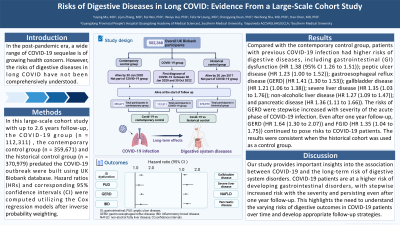Tuesday Poster Session
Category: Biliary/Pancreas
P2863 - Risks of Digestive Diseases in Long COVID: Evidence From a Large-Scale Cohort Study
Tuesday, October 24, 2023
10:30 AM - 4:00 PM PT
Location: Exhibit Hall

Has Audio
- YM
Yuying Ma, MD
Guangdong Provincial People's Hospital
Guangzhou, Guangdong, China
Presenting Author(s)
Yuying Ma, MD1, Lijun Zhang, MD1, Rui Wei, PhD1, Weiyu Dai, PhD1, Felix W. Leung, MD2, Chongyang Duan, PhD3, Weihong Sha, PhD1, Hao Chen, PhD1
1Guangdong Provincial People's Hospital, Guangzhou, Guangdong, China; 2University of California Los Angeles, Los Angeles, CA; 3Southern Medical University, Guangzhou, Guangdong, China
Introduction: In the post-pandemic era, a wide range of COVID-19 sequelae is of growing health concern. However, the risks of digestive diseases in long COVID have not been comprehensively understood.
Methods: In this large-scale cohort study with up to 2.6 years follow-up, the COVID-19 group (n = 112,311) , the contemporary control group (n = 359,671) and the historical control group (n = 370,979) predated the COVID-19 outbreak were built using UK Biobank database. Hazard ratios (HRs) and corresponding 95% confidence intervals (CI) were computed utilizing the Cox regression models after inverse probability weighting.
Results: Compared with the contemporary control group, patients with previous COVID-19 infection had higher risks of digestive diseases, including functional gastrointestinal disorders (FGID) (HR 1.38 (95% CI 1.26 to 1.51)); peptic ulcer disease (HR 1.23 (1.00 to 1.52)); gastroesophageal reflux disease (GERD) (HR 1.41 (1.30 to 1.53)); gallbladder disease (HR 1.21 (1.06 to 1.38)); severe liver disease (HR 1.35 (1.03 to 1.76)); non-alcoholic liver disease (HR 1.27 (1.09 to 1.47)); and pancreatic disease (HR 1.36 (1.11 to 1.66)). The risks of GERD were stepwise increased with severity of the acute phase of COVID-19 infection. Even after one year follow-up, GERD (HR 1.64 (1.30 to 2.07)) and FGID (HR 1.35 (1.04 to 1.75)) continued to pose risks to COVID-19 patients. The results were consistent when the historical cohort was used as a control group.
Discussion: Our study provides important insights into the association between COVID-19 and the long-term risk of digestive system disorders. COVID-19 patients are at a higher risk of developing gastrointestinal disorders, with stepwise increased risk with the severity and persisting even after one year follow-up. This highlights the need to understand the varying risks of digestive outcomes in COVID-19 patients over time and develop appropriate follow-up strategies.
Disclosures:
Yuying Ma, MD1, Lijun Zhang, MD1, Rui Wei, PhD1, Weiyu Dai, PhD1, Felix W. Leung, MD2, Chongyang Duan, PhD3, Weihong Sha, PhD1, Hao Chen, PhD1. P2863 - Risks of Digestive Diseases in Long COVID: Evidence From a Large-Scale Cohort Study, ACG 2023 Annual Scientific Meeting Abstracts. Vancouver, BC, Canada: American College of Gastroenterology.
1Guangdong Provincial People's Hospital, Guangzhou, Guangdong, China; 2University of California Los Angeles, Los Angeles, CA; 3Southern Medical University, Guangzhou, Guangdong, China
Introduction: In the post-pandemic era, a wide range of COVID-19 sequelae is of growing health concern. However, the risks of digestive diseases in long COVID have not been comprehensively understood.
Methods: In this large-scale cohort study with up to 2.6 years follow-up, the COVID-19 group (n = 112,311) , the contemporary control group (n = 359,671) and the historical control group (n = 370,979) predated the COVID-19 outbreak were built using UK Biobank database. Hazard ratios (HRs) and corresponding 95% confidence intervals (CI) were computed utilizing the Cox regression models after inverse probability weighting.
Results: Compared with the contemporary control group, patients with previous COVID-19 infection had higher risks of digestive diseases, including functional gastrointestinal disorders (FGID) (HR 1.38 (95% CI 1.26 to 1.51)); peptic ulcer disease (HR 1.23 (1.00 to 1.52)); gastroesophageal reflux disease (GERD) (HR 1.41 (1.30 to 1.53)); gallbladder disease (HR 1.21 (1.06 to 1.38)); severe liver disease (HR 1.35 (1.03 to 1.76)); non-alcoholic liver disease (HR 1.27 (1.09 to 1.47)); and pancreatic disease (HR 1.36 (1.11 to 1.66)). The risks of GERD were stepwise increased with severity of the acute phase of COVID-19 infection. Even after one year follow-up, GERD (HR 1.64 (1.30 to 2.07)) and FGID (HR 1.35 (1.04 to 1.75)) continued to pose risks to COVID-19 patients. The results were consistent when the historical cohort was used as a control group.
Discussion: Our study provides important insights into the association between COVID-19 and the long-term risk of digestive system disorders. COVID-19 patients are at a higher risk of developing gastrointestinal disorders, with stepwise increased risk with the severity and persisting even after one year follow-up. This highlights the need to understand the varying risks of digestive outcomes in COVID-19 patients over time and develop appropriate follow-up strategies.
Disclosures:
Yuying Ma indicated no relevant financial relationships.
Lijun Zhang indicated no relevant financial relationships.
Rui Wei indicated no relevant financial relationships.
Weiyu Dai indicated no relevant financial relationships.
Felix Leung indicated no relevant financial relationships.
Chongyang Duan indicated no relevant financial relationships.
Weihong Sha indicated no relevant financial relationships.
Hao Chen indicated no relevant financial relationships.
Yuying Ma, MD1, Lijun Zhang, MD1, Rui Wei, PhD1, Weiyu Dai, PhD1, Felix W. Leung, MD2, Chongyang Duan, PhD3, Weihong Sha, PhD1, Hao Chen, PhD1. P2863 - Risks of Digestive Diseases in Long COVID: Evidence From a Large-Scale Cohort Study, ACG 2023 Annual Scientific Meeting Abstracts. Vancouver, BC, Canada: American College of Gastroenterology.
